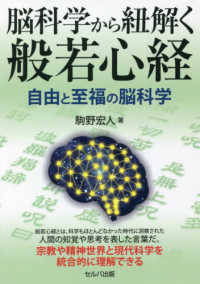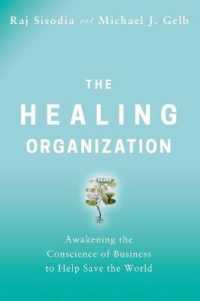- ホーム
- > 洋書
- > 英文書
- > Business / Economics
Full Description
HR 5.0: Adapting to the AI-Enhanced Workforce addresses the pressing need for comprehensive insights into the dynamic interplay between technology and human resources (HR). The authors, drawing from their extensive experience in Artificial Intelligence (AI), HR, and organisational development, present strategic frameworks that challenge organisations to view AI not as a threat, but as a catalyst for organisational growth.
As organisations transition into HR 5.0, characterised by advanced technological integration, HR professionals are required to navigate complexities and seize opportunities effectively. HR 5.0 encourages organisations to strike a harmonious equilibrium between human and machine elements, ensuring that the workplace remains not just efficient but also human-centric. The authors advocate for the augmentation of human capabilities through AI, fostering a work environment that is adaptive, resilient, and capable of thriving in the face of technological disruption.
HR 5.0: Adapting to the AI-Enhanced Workforce is a valuable resource for academics, executives, decision-makers, and technology professionals seeking to harness the full potential of data and technology for organisational success.
Contents
Chapter 1. Quantifying Employee Voices: A Study of Perception on the AI-Powered Chatbot; Akshatha Rajanna, Ganesha K S, and Vijay G Padaguri
Chapter 2. Unveiling the Human Element: The Evolutionary Journey from HR 1.0 to HR 5.0; Khusboo Agarwal, Amarnath Padhi, and Zahid Hussain
Chapter 3. HR Leadership and Strategic Management: Navigating Changes from Industry 1.0 to 5.0; Dhruv Sabharwal, Vishal Jain, and Renu Rana
Chapter 4. AI in Service: Engaging and Retaining Customers through Technology-Based Encounters and Employee Service; Amit Kumar, Shuchita Singh, and Kakul Agha
Chapter 5. The Influence of Artificial Intelligence (AI) on the Digital Transformation of Human Resources in the Context of Industry 5.0; Anish Patnaik, B.C.M. Patnaik, Ipseeta Satpathy, Vishal Jain, and Rocky Dwyer
Chapter 6. Delving Deeply into Emotional Intelligence to Foster Employee Well-Being in AI Driven Work Environment; Shuchita Singh, Alka Gupta, and Arpana Kumari
Chapter 7. Leveraging AI in Higher Education Teaching and Learning: Opportunities and Challenges Ahead; Nidhi Srivastava, Arpita Srivastava, and Priya Rao
Chapter 8. Workplace Evolution: The Role of AI in Shaping Productivity, Safety, and Employee Experience; Kriti Arya, Vandana Kumari, Mandeep Kaur, and Richa Chauhan
Chapter 9. Perspectives of Professionals in the Changing Landscape of HR 5.0; Nusrat Khan, Fehmina Khalique, Kartikay Saini, and Vishal Choudhary
Chapter 10. The IMPACT Framework: Shaping Gen Z Engagement in the Age of Industry 5.0; Prachi Agarwal, Rashi Agarwal, and Branka van der Linden
Chapter 11. Emotional Intelligence (EI) in the era of Artificial Intelligence (AI); Saba Inamdar and Riazuddin Ahmed
Chapter 12. A Study of Artificial Intelligence Effects on Human Resource Digitalization: Digital Recruitment 5.0; Taher Alkhalaf, Muskan Khan, and Monir Alkhalaf
Chapter 13. Critical Thinking in Mitigating AI-Induced Managerial Decision-Making Loss in Africa; Gladys Esinu Abiew, George Kofi Amoako, and Emem Anwana
Chapter 14. AI Leveraged Knowledge Management Processes for Organizational Performance and Organizational Innovation in Service-Based Companies; Arpana Kumari, Anuja Shukla, Eti Jain, and Muskan Khan








